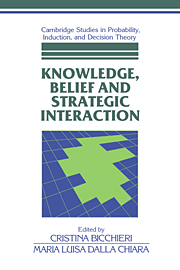Book contents
- Frontmatter
- Contents
- Preface
- List of contributors
- 1 Feasibility
- 2 Elicitation for games
- 3 Equilibrium, common knowledge, and optimal sequential decisions
- 4 Rational choice in the context of ideal games
- 5 Hyperrational games: Concept and resolutions
- 6 Equilibria and the dynamics of rational deliberation
- 7 Tortuous labyrinth: Noncooperative normal-form games between hyperrational players
- 8 On consistency properties of some strongly implementable social choice rules with endogenous agenda formation
- 9 Algorithmic knowledge and game theory
- 10 Possible worlds, counterfactuals, and epistemic operators
- 11 Semantical aspects of quantified modal logic
- 12 Epistemic logic and game theory
- 13 Abstract notions of simultaneous equilibrium and their uses
- 14 Representing facts
- 15 Introduction to metamoral
- 16 The logic of Ulam's games with lies
- 17 The acquisition of common knowledge
- 18 The electronic mail game: Strategic behavior under “almost common knowledge”
- 19 Knowledge-dependent games: Backward induction
- 20 Common knowledge and games with perfect information
- 21 Game solutions and the normal form
- 22 The dynamics of belief systems: Foundations versus coherence theories
- 23 Counterfactuals and a theory of equilibrium in games
9 - Algorithmic knowledge and game theory
Published online by Cambridge University Press: 05 November 2011
- Frontmatter
- Contents
- Preface
- List of contributors
- 1 Feasibility
- 2 Elicitation for games
- 3 Equilibrium, common knowledge, and optimal sequential decisions
- 4 Rational choice in the context of ideal games
- 5 Hyperrational games: Concept and resolutions
- 6 Equilibria and the dynamics of rational deliberation
- 7 Tortuous labyrinth: Noncooperative normal-form games between hyperrational players
- 8 On consistency properties of some strongly implementable social choice rules with endogenous agenda formation
- 9 Algorithmic knowledge and game theory
- 10 Possible worlds, counterfactuals, and epistemic operators
- 11 Semantical aspects of quantified modal logic
- 12 Epistemic logic and game theory
- 13 Abstract notions of simultaneous equilibrium and their uses
- 14 Representing facts
- 15 Introduction to metamoral
- 16 The logic of Ulam's games with lies
- 17 The acquisition of common knowledge
- 18 The electronic mail game: Strategic behavior under “almost common knowledge”
- 19 Knowledge-dependent games: Backward induction
- 20 Common knowledge and games with perfect information
- 21 Game solutions and the normal form
- 22 The dynamics of belief systems: Foundations versus coherence theories
- 23 Counterfactuals and a theory of equilibrium in games
Summary
What ye know, the same do I know also.…
Job 13:2INTRODUCTION
In game theory, the question “Who knows what?” is crucial at many levels. In poker, for example, it matters that you do not know what hands your opponents are holding, and they do not know yours. Knowledge and ignorance at this level are studied in the theory of games of imperfect information. In such games, the rules and the preferences of the players are taken to be commonly known. In real life, however, this is seldom a realistic assumption. To deal with such situations, one requires the richer theory of games of incomplete information.
This chapter is about neither of these informational levels. Its attention is directed at what players know about the results of the reasoning processes of other players. Traditional game theory takes it for granted that rational players can replicate the reasoning of their opponents, so that arguments of the type “If I think that he thinks that I think…” can be employed. Before authors became cautious about foundational issues, the underlying assumption would sometimes be expressed by saying, “It is taken to be common knowledge that the players are perfectly rational.” This assumption is sometimes referred to as the “implicit axiom of game theory.”
What does this implict axiom mean? There are at least three difficulties:
(1) Formal definitions of common knowledge, beginning with that of Aumann [3], require the prior existence of a state space, so that we have events or propositions about which we can claim to have knowledge.
[…]
- Type
- Chapter
- Information
- Knowledge, Belief, and Strategic Interaction , pp. 141 - 154Publisher: Cambridge University PressPrint publication year: 1992
- 6
- Cited by



